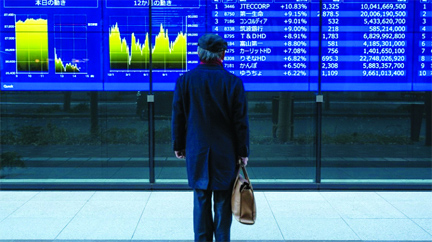
BEIJING (TIP)- Asian markets sank Wednesday as a mixed US inflation report did little to soothe investor worries that the Federal Reserve will continue to ramp up interest rates, which many fear could cause a recession.
The much-anticipated figures from January’s consumer price index showed a slight slowdown from the previous month, but the 6.4 percent reading was higher than forecast, suggesting a return to normality will take longer than hoped.
A number of top Fed officials also lined up to restate that borrowing costs will likely need to go higher and for an extended period if they are to bring inflation down to their two percent target.
Recent data had suggested the bank’s almost year-long rate-hike campaign was beginning to show results, providing fuel for a healthy run-up in global markets in January as traders began factoring in a possible cut towards the end of 2023.
But that optimism has taken a severe hit, with a blockbuster jobs report confirming that the world’s top economy remains robust, narrowing the scope for the Fed to ease up. After the figures were released, monetary policymakers reiterated their determination to stay the course, with expectations that rates could go well above five percent, from the current 4.5-4.75 percent.
Dallas Fed president Lorie Logan said: “We must remain prepared to continue rate increases for a longer period than previously anticipated, if such a path is necessary to respond to changes in the economic outlook or to offset any undesired easing in conditions.” However, Philadelphia Fed chief Patrick Harker said he thought the bank was “likely close” to being restrictive enough.
Wall Street ended mixed, having fluctuated after the data release.
But Asia sank back into the red.
Hong Kong led losses, shedding more than one percent, with China‘s reopening from zero-Covid no longer able to provide any cushion to sentiment.Shanghai, Tokyo, Singapore, Seoul, Sydney, Taipei, Wellington, Manila and Jakarta were also well down.The prospect of more rate hikes lifted the dollar against its peers on Tuesday, and it held its gains in Asian trade.”While in line, the CPI release is a reminder that lowering inflation towards the Fed’s target may be more gradual than conventional thinking,” said SPI Asset Management’s Stephen Innes.
“And this environment may also result in a higher-for-longer rate environment — somewhat counter to a market still pricing in a Fed funds rate cut later this year.”
Exports dip by 6.58 per cent in January; trade deficit lowest in 12 months at USD 17.75 billion
Contracting for the second month in a row, India’s exports dipped by 6.58 per cent to USD 32.91 billion in January due to slowdown in global demand, even as the trade deficit touched a 12-month low of USD 17.75 billion during the month, according to official data released on Wednesday. Imports in January too contracted by 3.63 per cent, the second consecutive month, to USD 50.66 billion.
Cumulatively, however, during April-January 2022-23, the country’s merchandise exports rose 8.51 per cent to USD 369.25 billion, while imports increased 21.89 per cent to USD 602.20 billion, the data showed.
The merchandise trade deficit for the April-January this fiscal stood at about USD 233 billion.
The country’s exports had contracted by 12.2 per cent to USD 34.48 billion in December 2022.
Source: Agencies





Be the first to comment